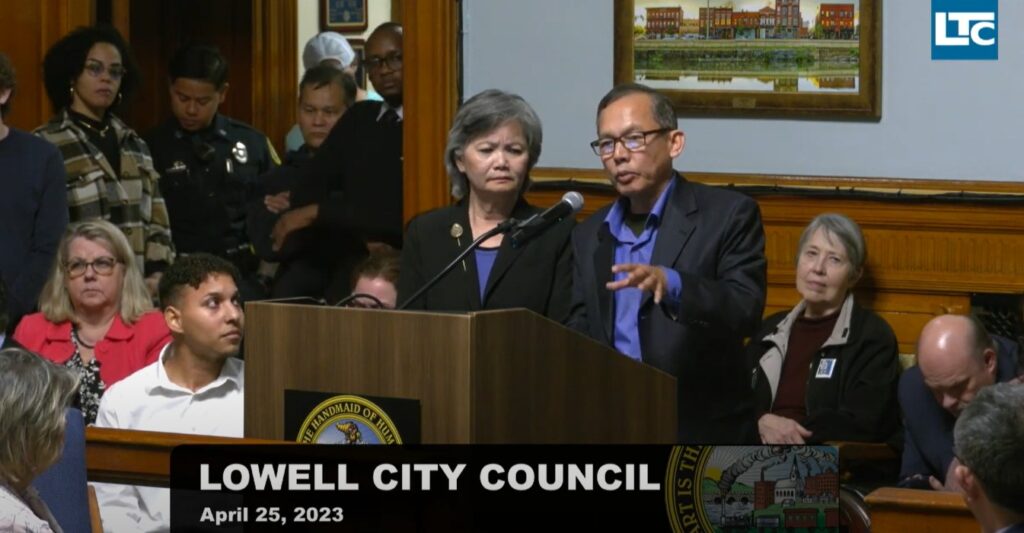I usually try to keep these light and/or stupid, but there’s just no way to work nonsense into a discussion on human rights violations and arresting the homeless.
1. Twisted Sister
The meeting was far and away dominated by the following motions:
M. Chau/C. Yem – Req. City Mgr. Have Law Department Provide A Report Regarding The Establishment Of A Sister-City Agreement Between The City Of Lowell And Phnom Penh, Cambodia; Referencing An MOU Signed January 14, 2015.
and
M. Chau – Req. City Mgr. And/Or Appropriate Department Begin The Process To Establish A Sister-City Agreement Between Lowell And Battambang, Cambodia.
The Motions were taken “out of order” as Council Chambers were packed with citizens in opposition. Cambodia is, on paper, a constitutional monarchy with a parliamentary government. However, in practice, it is a dictatorship with one party rule guilty of blatant violations of human rights. The U.S. Department of State notes, in part:
Significant human rights issues included credible reports of: unlawful or arbitrary killings; torture and cruel, inhuman, or degrading treatment or punishment by the government; arbitrary detention by the government; political prisoners and detainees; serious problems with the independence of the judiciary; arbitrary interference in the private lives of citizens, including pervasive electronic media surveillance; serious restrictions on freedom of expression and media, including violence and threats of violence, unjustified arrests or prosecutions of journalists, criminal libel laws, and censorship; serious restrictions on internet freedom; substantial interference with the freedom of peaceful assembly and freedom of association, including overly restrictive laws on the organization, funding, or operation of nongovernmental organizations and civil society organizations; inability of citizens to change their government peacefully through free and fair elections; serious restrictions on political participation; serious and pervasive government corruption, including in the judiciary; serious government restrictions on or harassment of domestic or international human rights organizations; lack of investigation of and accountability for gender-based violence; trafficking in persons; significant restrictions on workers’ freedom of association; and the worst forms of child labor, including forced or compulsory child labor.
In light of the above, the chamber was packed with citizens waiting to give the makers of the motions an earful on partnering with such a regime. However, before public comment, Councilor Yem withdrew his name from the Motion he co-sponsored. Mayor Chau then sought a “second” on the Motions and failed to receive one. As such, both died on the vine.
However, given the large crowd, Councilor Nuon, asked that the ten registered speakers – including a former member of Cambodia’s parliament – be afforded an opportunity to address the council.

Each of the ten provided impassioned disagreement with such a sister city agreement. None spoke in favor. Susie Chhoun, a member of the School Committee, stated that the motions were “not politically neutral” and were “designed to camouflage” the human rights violations noted above. Indeed, it’s not difficult to imagine how a dictatorship would leverage such an agreement as propaganda that would normalize and legitimize its regime.
Moreover, Ms. Chhoun’s comments suggest a “story behind the story” at play. I admit that I am almost entirely ignorant as to the relationships and power plays within the Cambodian community that may have given rise to these motions. Indeed, at the conclusion of the discussion, Mayor Chau attempted to explain that his intentions were good that he was not thinking of political dynamics. Based on the loud jeers he received from the gallery, one could conclude that the citizens in attendance were not buying it.
Councilor Scott wisely noted that the City should develop guidelines or criteria as to the qualities necessary for such relationships.
2. Time to Use More Sticks?
Some (most?) in the city have a perception that we use too many “carrots” and not enough “sticks” when dealing with homelessness and its consequences. Again and again (and again) the council discusses the tightrope that must be traversed to treat the unhoused with dignity and respect while at the same time protecting the interests of business owners and residents.
A “new” twist on the discussion came up for debate with Councilor Robinson’s Motion:
Req. City Mgr. Have Appropriate Department Provide A Detailed Report On Feasibility Of Implementing A No Overnight Camping, Sleeping Or Loitering Ordinance In Our Business Districts, As Well As, In The Summer Street, Gallagher Terminal And South Common Area.
I say “new” because Lowell and other cities have been down this road before. In 2015 the city lost a federal lawsuit pertaining to an “anti-panhandling” ordinance. U.S. District Court Judge Douglas Woodlock ruled the ordinance violated First Amendment protections. In addition, other cities have tried and failed to enact similar “anti-camping” ordinances. These measure often fail as courts find that anti-camping ordinances violate the Eighth Amendment of the U.S. Constitution – if no alternatives to sleeping in public are available (viewed ss cruel or unusual punishment). In essence, criminalizing homelessness won’t fly.
However, the fact that such an ordinance stands on shaky legal ground does not mean that we should not have this conversation. As the homeless population grows, so too do incidents of harassment, littering, pubic defecation, trespassing, etc. It should go without saying that such behaviors cannot be allowed to stand in a society. In his 2015 decision, Judge Woodlock took pains to point out that some of what Lowell trying to prevent was already covered as assault or under a Lowell law that bans obstructing a sidewalk. As such, the City likely doesn’t need a ban on “overnight camping.” What the city needs to to show residents and business owners that it “has their backs” by enforcing laws already on the books. We have laws against trespassing, drugs, public drunkenness, assault, obstructing traffic, etc. – not to mention zoning and sanitary codes. These laws pass constitutional muster and can and should be used to set a standard for acceptable behavior.
Of course, we can’t arrest our way out of this problem. The courts will be clogged and the same individuals will keep cycling through the criminal justice system then back on the street. Maura Fitzpatrick, our Director of Homelessness Initiatives noted that we need to build up the support systems that would help break the cycle.
However, as noted last night by the owners of the Purple Carrot and Warp & Weft, if we continue to turn a blind eye to lawlessness, our Downtown business community could be lost. Accordingly, there is value in using criminal legal remedies as a means of showing residents and business owners that the city hears them and is willing to uphold the law.
3. The Rest
A. Once again, the Council failed to get through the full agenda and the meeting ended at 10 p.m. Councilors Gitschier and Jenness favored staying past 10 p.m. However, as the City was hacked on Monday, the administration may not be able to put together a new agenda this Friday. As such, the unfinished business will be taken up on May 2nd.
B. Interesting Motion Response on feasibility of issuing separate tax bills for city and school operations. It’s likely not going to happen, but worth checking out.
C. Councilor Yem once again asking that the word “STOP” be painted at an intersection. If this is effective, I’m all for it, but last night I started wondering if this even works. Can we get a report from the Traffic Engineer? In my day job, I’ve seen some research suggesting that the stop lines are basically useless.
D. Couple of noteworthy speakers on “Improving the Optics of Lowell” and “Use Of Residential Properties As A Space For Automotive Work.”
E. The Town & City Festival is this weekend.
See you next week!

Pretty interesting, thanks for the summary of the meeting. I was quite surprised that the motion for a sister city was taken up since there was pushback the last time a person from the Cambodian government was here.
On the banning of overnight camping, it reminded me of that presentation of popup homes for the homeless to transition to a while back. I get those are specifically for transitioning, but I wonder if that could be used for just regular stays so the homeless don’t have to sleep in the open, just a thought.
Again thanks for the coverage, was not expecting the first motion to draw on quite a crowd.